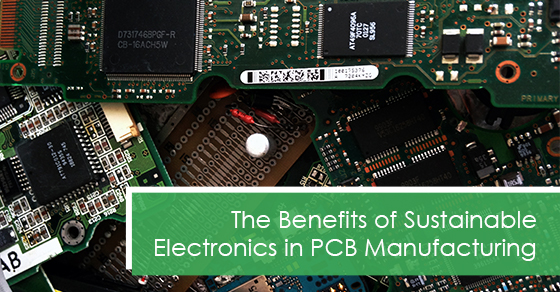The Benefits of Sustainable Electronics in PCB Manufacturing
How Sustainability Fits into the World of Electronics
Although the concept of recycling has certainly been around for a long time, the introduction of recyclability and sustainability to the world of electronics is a much newer concept. After all of the rigorous testing and production that electronics typically go through, we do not tend to think of them as needing to be replaced.
However, like most things, electronics are finite, meaning it is rather important to consider what will happen to them when they can no longer be used.
Most people own multiple electronic devices, but few of us realize that these devices can be recycled. Electronic waste is a significant problem around the world. There are tens of millions of metric tons of discarded devices around the world every year, making it a major contributor to our pollution problem.
A startlingly low percentage of electronics are actually recycled when they are no longer used, and at least in part, this has to do with the necessity to take apart and separately recycle the various materials in these devices.
Since printed circuit boards (PCBs) contain a close-knit mix of various materials, it is even harder to recycle them. PCBs often contain metals like gold, silver, and copper, as well as glass, fiberglass, and plastic. While there are certain parts of the board that contain harmful toxins like mercury, lead, and beryllium, many parts of the board can, in fact, be recycled, and there are a number of benefits to doing so.
What areas have sustainability initiatives for PCBs?
In the world of electronics, there are a number of relevant factors that contribute to sustainability, including the use of new raw materials for fabrication that are not toxic for the environment and that are recyclable so that they may be continually reused.
If we take the PCB manufacturing process as an example, one major area in which there is room for improvement is regarding the use of solder, which is a material that melts to form solid metal joints between the pins of electronic components and the metal landing pads on a PCB.
Since solder contains large amounts of lead and other hazardous materials, it is unsafe for humans and the environment. This is why it is much better to manufacture PCBs using green technology lead-free solder, which is much more environmentally friendly.
This is not the only part of a conventional PCB that could benefit from some remodeling, as there are also sustainability issues pertaining to the use of fiberglass and epoxy in them.
The Benefits of Using Sustainable Electronics Materials in PCB Manufacturing
It is possible to reverse at least some of the impacts that the PCB manufacturing industry has had on the environment by using innovative methods to produce environmentally friendly PCBs. These methods range from using inkjet and laser printing to producing fully biodegradable boards.
Although there are some limitations to the current sustainability approaches when it comes to PCB design, some of the innovations in the following areas are promising, as there seem to be a number of ways that we can benefit from them:
Additive PCB Printing
Using 3D-printed electronics, conformal electronics, aerosol, inkjet and laserjet printing, and direct wire production, additive PCB printing processes remove the necessity for multistep subtractive processes. Subtractive processes tend to remove and waste unneeded materials, but additive manufacturing only applies needed materials.
Additive processes do not require etchants or photomasks, and are well-suited for complex designs on thin substrates. When PCBs are created through 3D printing, little or no material waste occurs.
Paper PCBs
Researchers have begun producing paper-based multilayer PCBs, which could offer significant environmental benefits. Unlike non-biodegradable glass fiber and epoxy boards, biocomposite boards do not contain chemicals. Biocomposite boards offer a dielectric constant that varies between 2 and 36, and do not exhibit problems when exposed to high humidities or high temperatures.
When the boards reach the end of their lifecycle, the layers of ink, adhesive, and polymers can be separated easily and become available for reuse.
How Circuits Central Makes Sustainable PCB Design Easy
When it comes to PCB manufacturing in Toronto, there is no better place to go to design, assemble, and manufacture PCBs than Circuits Central. If you want to manufacture top-quality, high-performing PCBs while ensuring sustainable PCB materials are used, our team of engineers and design experts would be glad to help you put together exactly what you are looking for.
We are constantly working on developing new processes to develop PCBs that incorporate cutting-edge technology, and we will apply the same approach to any projects that you bring our way.
We value our clients’ timelines and budgets, which is why we make things easy for you, offering a one-stop shop experience. Thanks to our many years of experience and unmatched expertise, we can handle all aspects of PCB manufacturing from beginning to end, including material management, PCB assembly, cable assembly, product testing, and integration.
That way, you do not have to worry about wasting your time getting in touch with all kinds of different service providers and making multiple deals just to get a single PCB manufactured.
If you are new to using sustainable materials in your PCB design and you would like to test the functionality of such a new and innovative design, we can also create functional and refined product prototypes so you can do just that.
Being able to see and test such prototypes often helps in the process of making critical design choices. Whatever your business objectives are, we will do what we must to help you meet them and to ensure that your PCBs are top-of-the-line.
For more information about how we can help you create sustainable and recyclable PCBs, call Circuits Central at 1 (888) 602-7264 or email us at info@circuits-central.com.

